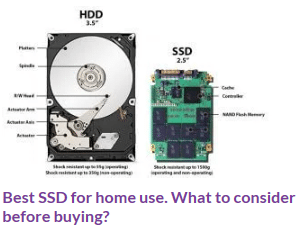Last Updated on March 14, 2021 by Shivanandana Hegde
Comparing Crucial MX500 with Samsung 860 EVO
I own both Samsung 860EVO and Crucial MX500. So, if you want to know how crucial mx500 vs samsung 860 evo perform against one another, read on.

The images that I’ve attached below are from a widely used disk bench-marking software called CrystalDiskMark Standard Edition.
Testing Samsung 860 EVO vs Crucial MX500 with less memory read/write for less number of times.
From the first test,(less memory written for less number of times] it seems Samsung is clear winner.. but hold on till you see the next test result.


Testing Crucial MX500 vs Samsung 860 EVO with larger memory read/write for more number of times.
If you see the next set of images, where more memory is written more number of times, you’ll see there is a significant drop in Samsung’s performance. This is what I mentioned about internal programming of SSD. Where as you’ll see Crucial MX500’s speed is almost same in both cases. (Consistency).


My SSD analysis conclusion
Below is the summary of comparison of crucial mx500 vs samsung 860evo:
Key Learning
1) SSD is like a ‘mini-computer’ in itself. Therefore, it is not just an empty space to put data on. There are hundreds of operations that happen when writing and reading the data. There is a dedicated micro-computer/processor inside an SSD. It has it’s own cache, it’s own programming etc.
2) Samsung 860 EVO → Best suited for smaller amount memory which are written less frequently.
3) Crucial MX500 → Suited for steady, long term, non spiking performance. ?
NOTE: For a home user, this guide will help you choose the best SSD that suits your needs.




2 replies on “Crucial MX500 vs Samsung 860 EVO – Detailed comparison”
I stumbled across this page and think you need to make some revisions for accuracy. You must have been running the Samsung 860 EVO SSD with the optional Samsung RAPID caching software running to reach the read/write performance levels you show in the 1000 MB Crystal DiskMark:
1000 MB
Sequential Write: 1,387 MB/s <==not possible with a SATA 3 interface without caching software
512K Read: 1,956 MB/s Write: 1,058 MB/s <==not possible with a SATA 3 interface without caching software
The caching software is also skewing your 4000 MB CrystalDiskMark results for the Samsung 860 EVO.
The Samsung RAPID mode caching software uses a portion of your computer's RAM to cache writes to the SSD, and will give you an artificial performance level near a NVMe PCIe x2 drive.
You should disable the Samsung Rapid caching software, reboot to a clean start to remove the cache and rerun the benchmarks. I expect that you'll see that the Samsung 860 EVO is about 3% – 7% faster overall than the Crucial MX500 .
Hi @Scott, Thanks for stopping by. Appreciate your details.
This article is meant for regular home/business users who would ideally run the disks with softwares that come with them. So, I would still stick with what is practical for everyday use rather than doing a disk level benchmark.